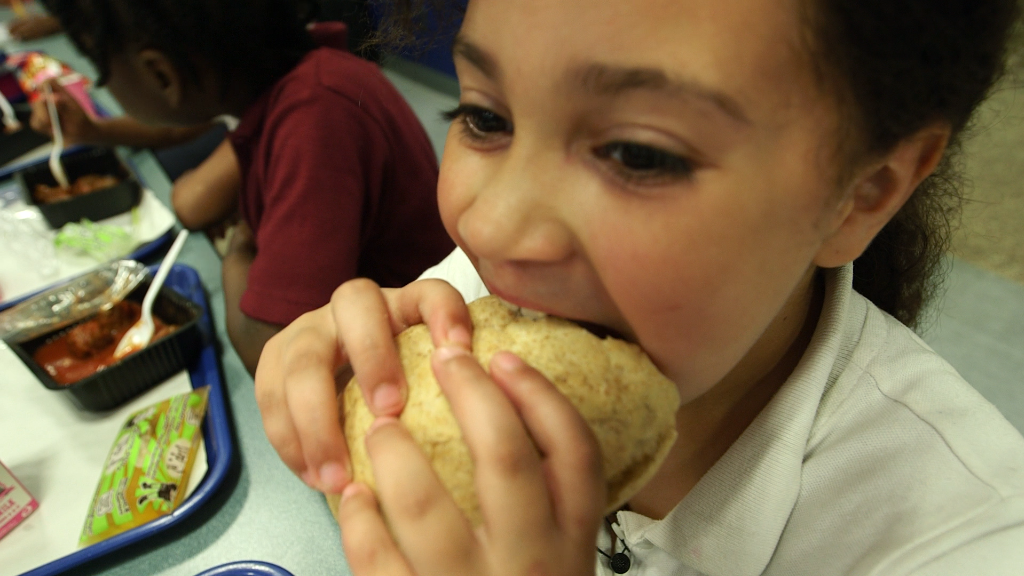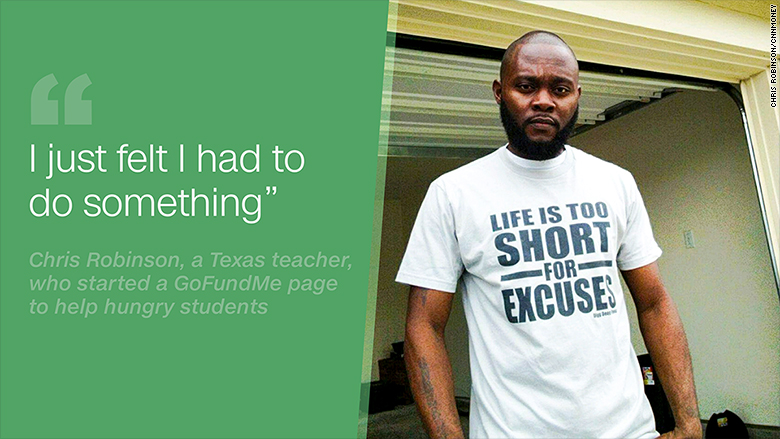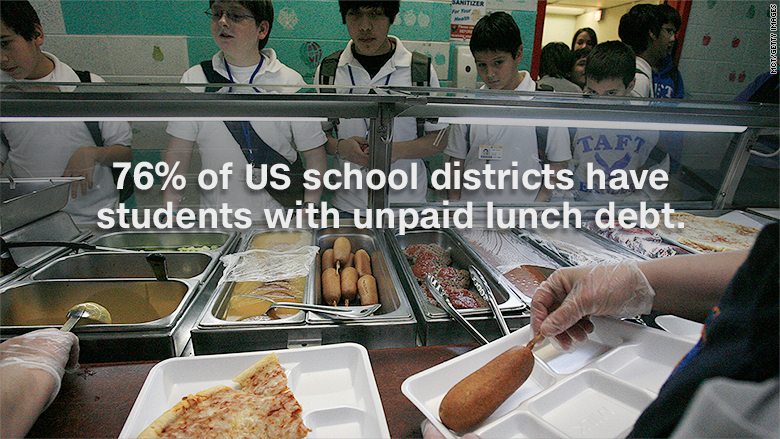
Here's an issue Republicans and Democrats agree on: Ending the "barbaric" practice of school lunch shaming.
A school lunch costs around $2.35. When a kid doesn't have enough money, many schools require cafeteria workers to take a kid's tray of hot food away and throw it in the trash. Children are then handed a cold cheese sandwich -- or they are forced to go hungry with no food at all.
In some cases, penniless kids are even forced to wear stamps, stickers or wristbands that mark them having unpaid lunch debt.
"No one believes we do this to kids," says Jenny Ramo, executive director of New Mexico Appleseed, a nonprofit that works to eliminate poverty. It's "barbaric."
A bipartisan group of lawmakers in the House and Senate recently introduced the Anti-Lunch Shaming Act of 2017 to curb the worst of these shaming practices.
"We want schools to work with parents, not target the student, to address outstanding lunch payments," says Republican Congressman Rodney Davis of Illinois, a co-sponsor of the bill.
Related: School lunch shaming: Inside America's hidden debt crisis
Outrage has escalated around the country as more people learn about this practice. After CNNMoney published a story on school lunch shaming, there was an outpouring of reaction. We received over 130 emails from readers, including members of the armed forces. Many wanted to help.
Readers opened up their wallets to donate to the two GoFundMe pages that were highlighted in the story, and each of them raised exponentially more money for their cause.

Special Education teacher Chris Robinson started a GoFundMe page to ask for donations to pay off school lunch debt in the Fort Bend School District in Texas so no kid would be denied a proper meal.
After he was featured in the CNNMoney story, his page raised nearly $20,000, compared to about $700 before that. Robinson carries around a photo of a touching "thank you" note from an elementary school student who he helped through the campaign.
Amina Ishaq, a PTO president for an elementary school outside Houston, Texas, was also featured in CNNMoney's story. She raised over $18,000, which surpassed her goal to raise $15,500 to pay off all the school lunch debt in her school.
In a note to CNNMoney, Isaq called the donors "angels." She was thrilled that "so many kids are gonna benefit!"
How to help: Call Congress
Many other readers shared their own appalling stories of lunch line trauma, including one woman who said she started prostituting herself as a teenager to get enough money to eat.
"Call your member of Congress about lunch shaming," urges Ned Adriance, Senator Tom Udall's press secretary. He says members of Congress are "listening more than they ever have" to constituent calls.
The bill in Congress specifically forbids schools from "public identification or stigmatization" of kids who don't have enough money for lunch. That means no more stamping a kid's hand, forcing them to wear a colored wristband or do extra "chores" when they have run up debt in the school cafeteria.
Cafeteria workers would also be banned from taking a tray of hot food away once a kid has been served in the lunch line.

"We can't expect our kids to succeed in the classroom if they are hungry," said Senator Udall, a Democrat from New Mexico who introduced the bill.
In April, New Mexico became the first state to ban all lunch shaming. The state's representatives in Washington want action at the national level, as well.
Related: Fast track job to the middle class: Become a dental hygienist
How to help: Call a school near you
While many applaud the federal bill as a good "first step," they worry it doesn't go far enough. Schools could still refuse to serve kids who can't pay or offer them a cold cheese sandwich, says Ramo. In contrast, the New Mexico state bill prevents schools from offering lesser quality meals to kids with debt.
In addition to fundraising sites like GoFundMe and SchoolLunchFairy, some schools like the Austin School District accept donations to pay for needy kids' school lunch debt right on the district website. Or people can call or write to their the food service manager of their local district.
The U.S. Department of Agriculture, which oversees school breakfast and lunch programs, is requiring that all districts have a written policy in place by July 1 detailing whether the school will hand out cold cheese sandwiches or take other action once a child's debt hits a certain amount. Local input could make a difference in shaping those policies, advocates say.
Some ask: Why are parents so negligent?
Some CNNMoney readers were angry that parents could be so negligent that they would let their kids starve or face humiliation.
"This is mostly a problem of irresponsible parents," a reader named Richard said. His sentiment was echoed by dozens of other readers. Why should taxpayers pick up the bill, they wondered, when parents aren't prioritizing their own kids?
School lunch directors like Matt Antignolo of the Lamar Consolidated School District near Houston say that some parents may be gaming the system, but the vast majority of students running up these debts are poor and come from families that lack education. The households are either right above the cut-off line for aid or they meet the qualifications for free lunches but don't apply.
Related: Growing up poor makes it harder to succeed: Janet Yellen
Joyce Melbourne is an elementary school teacher in Florida who paid out of her own pocket for one of her student's lunches when the child received the dreaded cheese sandwich.
"Her eyes were filled with tears. All the other students had pizza and she had the thickest cheese sandwich I've ever seen in my life," Melbourne told CNNMoney. She says a lunch lady sniped at her, asking whether she was going to do this every day since the child owed so much money.
"I knew that as one of my brightest students, I needed her to finish her day on a positive note," Melbourne replied.
It turns out the the problem was that the young girl's parents were not proficient in English. Melbourne asked a translator to work with the family to fill out the paperwork. The student was able to get on the free meal program, but Melbourne can see how other students could miss out for years if someone didn't intervene.
"Children should not be punished because their parents can't pay," Melbourne says.


